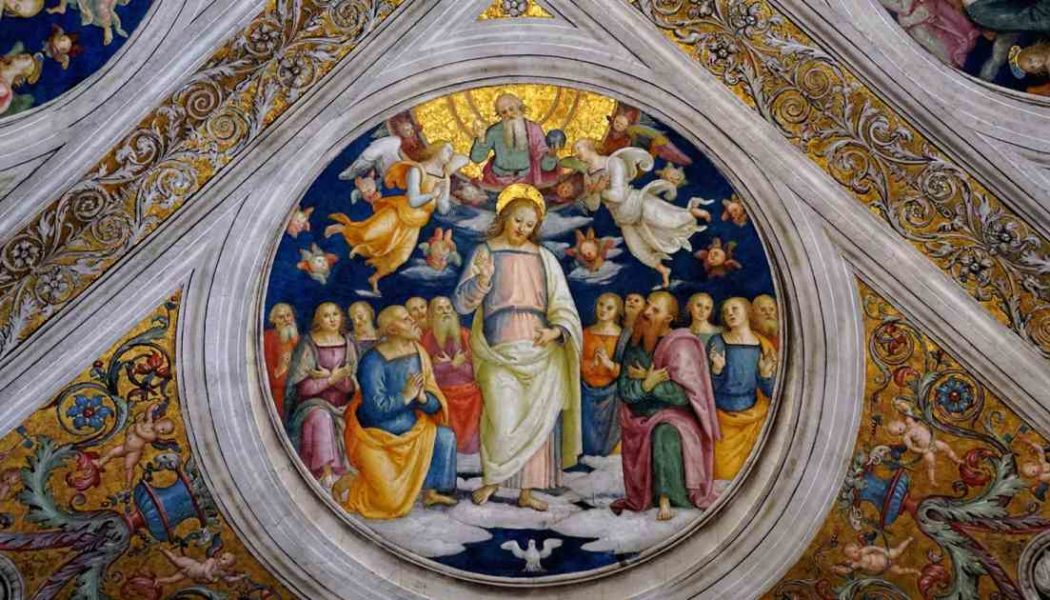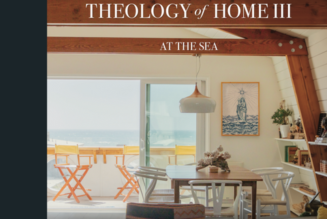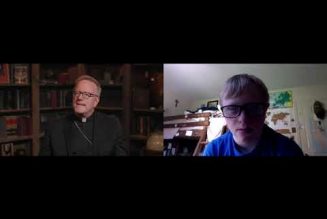
God in his genius found a way for us to understand even something as mysterious as the Trinity, and we see it on the Solemnity of the Most Holy Trinity, Year B.
It can be difficult to relate to God. He is invisible. He is outside time and space. The Trinity is a mystery beyond comprehension: the mystery of who God is in himself. As St. Augustine put it, “If you understood him, it would not be God.”
So God can seem complicated and abstract. To make matters worse, human beings are slow to understand even the details of our own lives, and prone to error and sin. Put the two things together — the grandeur of God and the weakness of us — and all kinds of problems ensue. To try to understand God, some reduce the divine to a cosmic force, a creative energy that fills the universe and which we will join one day. Others see him as a dictator, angrily lashing out at us from afar.
So God, in his genius, sent Jesus Christ, true God and true man, to solve both problems. By focusing on Jesus, we put a face on the reality of the Trinity who feels so abstract, and we get a better grasp of the goodness of humanity, which feels so weak and unworthy.
The Trinity is there, implicitly, in each line of the Gospel passage from Matthew this Sunday.
“The eleven disciples went to Galilee, to the mountain to which Jesus had ordered them,” it says. “When they all saw him, they worshiped, but they doubted.”
In the Old Testament, God met his people on mountaintops. Here Jesus orders his people to a mountaintop in his home region. It’s a strange mixture of a man meeting friends in his old neighborhood and God receiving homage in the heights. The great difference between God and man is on display here: Jesus is a figure of worship, the human beings with him are weak and doubting.
But then Jesus says something fascinating. He says, “All power in heaven and on earth has been given to me.” Think of the full implications of that statement. First of all, “All power in heaven and on earth,” means every power: every divine power; every human power; all of it.
But just as important is that phrase, “has been given to me.” To say “I am all powerful” is one thing, to say “all power has been given to me” is quite another. It assumes that there is some Other who is all powerful and shares that power freely with Another who is also all-powerful. The power Jesus has is all his, but is not his alone. It is something he receives.
But more than something he receives, it is something he continues to give away. Look at what he says next: “Go, therefore, and make disciples of all nations.” That therefore is fascinating. Why “go, therefore”? Because Jesus is giving his power to his Church. This is Jesus who said “Wherever two or three are gathered in my name, there am I in their midst.” This is Jesus who says “whatsoever you do to the least of my brothers, that you do unto me.”
He identifies himself as one with those who follow him. So all power is shared from the Father with the Son, and that sharing of power is so great it draws us into it.
St. Paul learned this better than anyone, and explains just how true it is that in Jesus Christ, we see the Trinity.
“Those who are led by the Spirit of God are sons of God,” says Paul in the Second Reading. We aren’t slaves in the Trinitarian system, earthlings who cringe in fear of the Almighty, Paul says, “but you received a Spirit of adoption, through whom we cry, ‘Abba, Father.’”
This is at long last the fulfillment of everything he came to do, from the moment John announced that the one to follow him would baptize us with the Holy Spirit to the moment the Holy Spirit descended on Mary and the Church at Pentecost.
All along, Jesus has made clear that he is an icon of the Trinity — and that we would join him in his inner life. Jesus said “he who has seen the Father has seen me,” and “I and the Father are one.” He promised the Father would give us the Holy Spirit. He breathed the Spirit on his disciples and said the Holy Spirit would teach us all about him and even tell us what to say.
Now we learn one thing he will tell us to say: Abba, Father — Papa, God. Jesus is serious. We are truly drawn up into God’s own life.
As Pope Benedict XVI put it: “The God of the Bible is not some kind of monad closed in on itself and satisfied with his own self-sufficiency, but he is life that wants to communicate itself; openness, relationship.” What does that mean for us? “For this reason the human person, image of God, is fulfilled in love, which is the sincere gift of oneself,” said Pope Benedict.
Or, as Augustine put it — the same Augustine who said that if we understand God, it isn’t God: “If you see charity, you see the Trinity.”
We like to say the Trinity’s relationship is like a family, but it turns out something more profound is true.
Yes, a family is like the Trinity — the father and mother’s love produces a third person, the child. But something more than that is true: The Trinity is not just like a family, it is a family, and we are part of it.
We have been adopted by the Father with Christ through the Holy Spirit. What we say about this relationship is not just talk: We are one body in Christ, and that means we are united with the Son of God, our brother; Abba God, Our Father; and the Holy Spirit which is the bond of the Father and the Son binds us too.
As children, we could not fathom our parents’ relationship, but we could see that it included us. In the same way, we may not understand how God works in himself, but through Jesus we know how God works in our lives.
But just as life in our human family is not a life of rest and ease, but life of constant service to the others in our home, so too our relationship with God is not a life of relaxation, but of service.
The First Reading spells out what that service entails, and what motivates it.
In the first reading, Moses says to the people: “Did anything so great ever happen before? Was it ever heard of?”
Then he says a number of suggestive things: He speaks of the voice of God, speaking from the midst of fire. That’s an image of God almighty speaking his Word in the Holy Spirit. Then he says God took their nation for himself “by testings, by signs and wonders, by war, with strong hand and outstretched arms, and by great terrors.” Moses is talking about the Exodus from slavery in Egypt but his words also describe Jesus on the cross, who with outstretched arms defeated Satan and delivered his people from slavery to sin.
But to join God in the place he has prepared, “You must keep his statues and commandments,” says Moses. That’s the first service we do. We enter into the Trinity as adopted children enter into a new family: We have to leave our previous family behind and adopt the ways of the new family wholeheartedly. That means changing our way of life.
The Second Reading gives another “if” condition to our life in the Trinity.
St. Paul says we are heirs with Christ “if only we suffer with him.” This is not futile suffering; it’s the pain a winning team tolerates on the way to victory. Jesus describes the victory: “Go, therefore, and make disciples of all nations … teaching them to observe all that I have commanded you.”
That means not just being good people among bad people, or Christian good people among people who are good in a different way: It means transforming the cultures of nations to direct them toward Jesus Christ. And more than that, Jesus says, our task is to transform people by “baptizing them in the name of the Father, and the Son and the Holy Spirit.”
Christ gives us power not to triumph over others but to share his power with them, baptizing them into the Trinity where we ourselves live.
After the “ifs” come the promises.
You keep the commandments, says Deuteronomy, so “that you and your children after you may prosper, and that you may have long life on the land which the Lord, your God, is giving you forever.”
That is an impressive promise. St. Paul shares a greater one. We suffer with him, he says, “so that we may also be glorified with him.”
There is a reason this is called the Great Commission. It is a shared mission, our co-mission with Jesus, and if we do the work he calls us to, says Jesus, “Behold, I am with you always, until the end of the age.”
That is not a bad trade-off.
Image: Slices of Light, Flickr.








